An epicurean adventure to: The United Kingdom
Prepare to debunk the myths surrounding British cuisine!
Having spent 18 years on this fairest of fair isles, I can confidently tell you that British food is an unsung hero, every bit as remarkable as its international counterparts.
From the iconic fish and chips to the hearty meat pies and, of course, the cherished Sunday roast!
But today, we're shining the spotlight on the hidden gem of British culinary tradition - the crispy, roast potato. No one does roasted potatoes quite like the Brits. End. Of. Story. I am prepared to wrestle anyone that disagrees.
And who can resist the siren call of a perfectly crisp spud?
In this recipe, we'll guide you through the steps to create the ultimate crispy roasted potatoes for your Sunday feast or special holiday gatherings. Please read through the blog post to make sure you've taken note of all the important tips and tricks.
We've been at this roast potato thing for a while now, trying all the tricks in the book. We're confident that this method is the one to stick with because it never disappoints.
So, what's the secret sauce? We'll reveal a few key tricks:
- We'll help you choose the right potatoes.
- We're going for larger potato chunks, not too small because they need to withstand some roughing-up. If you want bite-sized tatties, try this lovely Parmentier Potatoes recipe instead.
- Discover the magic of boiling your potatoes in water with a touch of bicarb to achieve unparalleled crispiness.
- Unveil the secret of shaking the potatoes vigorously to roughen their surface, a critical step for that coveted crunch.
- We'll show you how to harness the often-overlooked magic left behind in the pot after roughening the potatoes - "the sludge".
Now, here's what we're steering clear of in this recipe:
- There's no need for semolina during the roughening process. These unadulterated tatties can rough themselves up without adding additional texture.
- Fresh garlic and herbs aren't part of this recipe because the extended high heat can make them bitter.
- We're simplifying your journey by skipping the complicated and often risky step of preheating oil in a large tray before adding the potatoes.
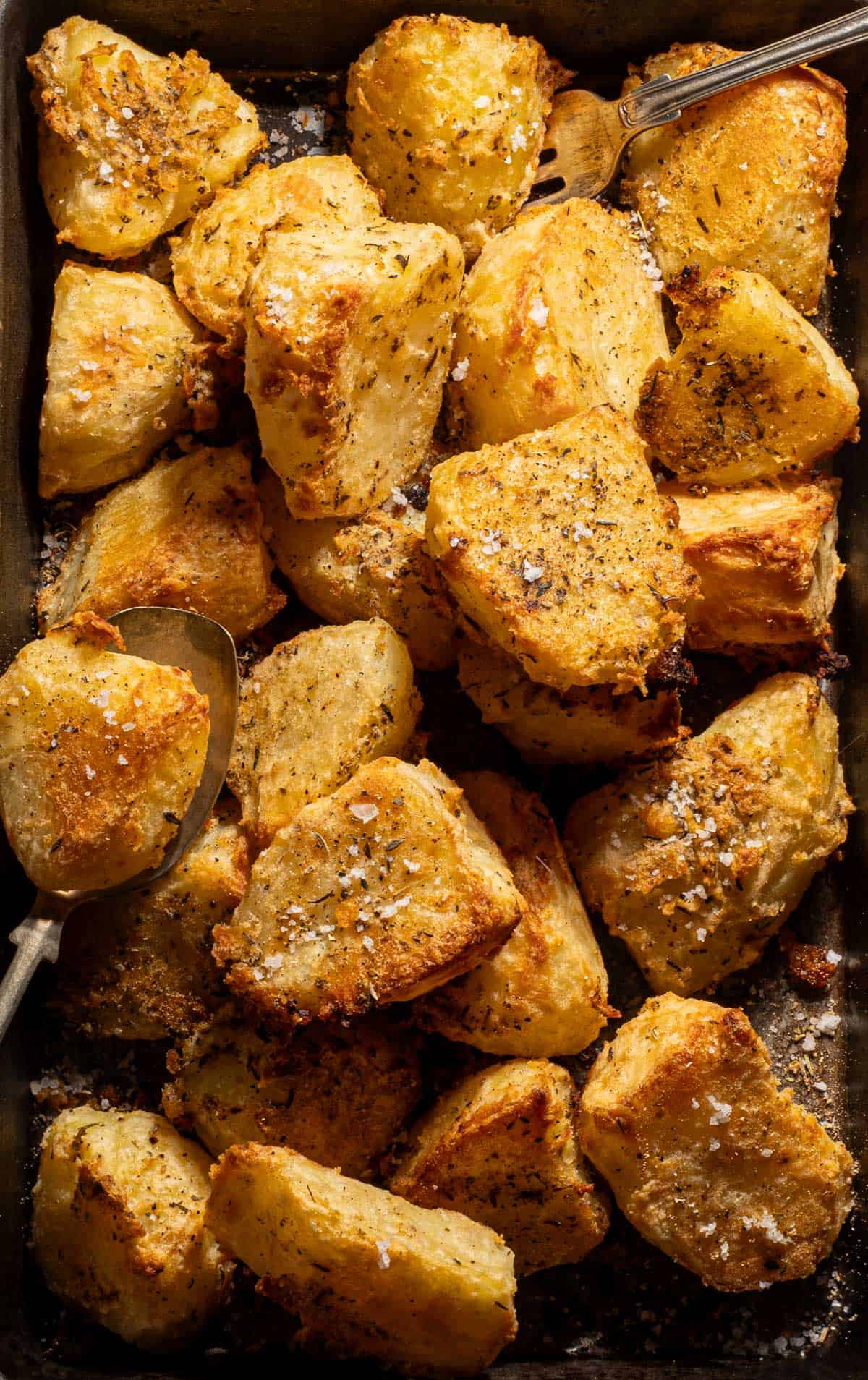
Jump to:
- Fast facts - United Kingdom
- What's to love about this recipe
- Key ingredient notes and substitutions
- Using 'The Sludge' left behind in the pot
- In summary - The secrets to the perfect roast potatoes
- Step-by-step guide:
- Variations
- Steps you can prep in advance
- Storage
- More recipes for side dishes
- More potato recipes
- Recipe
Fast facts - United Kingdom

| Location | The United Kingdom (UK) is located in North-western Europe, comprising four countries: England, Scotland, Wales, and Northern Ireland. |
| Capital | London. |
| Language | In addition to English and Welsh, the United Kingdom is home to a rich linguistic diversity with twelve other indigenous languages used including Gaelic, Cornish, Manx, Scots and three sign languages. English stands as the most widely spoken language, while Cornish is among the least commonly used. |
| Population | Circa 66.8 million people. |
| Trivia | The iconic lineage of the late Queen Elizabeth's Corgis stretches across an impressive 14 generations, commencing with the arrival of Susan, a Corgi who was presented to Her Majesty on her 18th birthday in 1944. Over the decades, this loyal canine legacy has brought joy to the Queen's life and became a symbol of her enduring love for these charming companions. |
What's to love about this recipe
- This easy recipe is all about achieving the ultimate level of crispiness in your roast potatoes.
- We guide you in choosing the right type of potato.
- Discover the magic of boiling potatoes in alkaline water with a touch of baking soda to take your roast potatoes to the next level of crispiness.
- We make the most of every element in this recipe, even the often-overlooked "sludge" left in the pot.
- No need to fuss with preheating oil in a large tray, making this recipe straightforward and hassle-free.
- For those who have a deep love for oven-roasted potatoes, this recipe is a game-changer.
- Excluding duck or beef fat from the recipe makes it suitable for vegans and vegetarians
Key ingredient notes and substitutions
**Please see the recipe card at the bottom of this post for the full list of ingredients.

The potatoes
Choosing the right potato:
It's really important to choose the right potato for roasting as it can have a direct impact on the outcome of your roasties.
The ideal roasting potato has a high starch content with a dry, floury texture, which helps it achieve a crispy and golden exterior while maintaining that sought-after light and fluffy texture inside when roasted.
On the other end of the scale, waxy potatoes work great in dishes where you want to keep the potato pieces in tact and 'neat', such as in potato salad. They also have creamy interiors compared to the drier texture of the starchy varieties.
Here are some excellent potato options to consider for your roasties:
- Maris Piper potatoes - United Kingdom
- King Edward potatoes - United Kingdom
- Russet potatoes - United States and Canada
- Yukon Gold potatoes - United States and Canada
- Desiree potatoes - Australia
- Dutch Cream potatoes - Australia
- Caren potatoes - South Africa
- Darius potatoes - South Africa
In many countries, you'll find potatoes labelled simply as 'potatoes' without any indication of what kind of potato it is. However, often the bag will indicate their best use. Look for ones labelled as suitable for roasting. Definitely don't use salad potatoes, baby potatoes or fingerling potatoes.
How big to cut the potatoes:
Be careful not to cut your potatoes into too small chunks to avoid them falling apart.
To achieve the perfect crispy potatoes, we use alkaline water and give the potatoes a good shake in the pot – no gentle treatment here.
If the potatoes are too small, they might not hold up during this boot camp. Check the photo below under the step-by-step guide for a size reference.
Although, as a rough guide, go for pieces no smaller than 5cm-7.5cm (2"-3") in length. For medium-sized potatoes, this means halving them and then halving each half to make quarters. If you're working with larger potatoes, consider cutting them into chunky sixths or eighths (only when they are very large).
The water
You might be familiar with the idea of starting with cold water when boiling potatoes, as it ensures even cooking both inside and out.
However, when it comes to roast potatoes, the opposite is true. Here, you actually want the edges to soften up faster than the centres, so start by boiling them in hot water.
This recipe is meant for a large batch of two kilograms of potatoes, enough to feed six people. Use a large saucepan to ensure the potatoes parboil evenly and to prevent any messy spillovers onto your clean stove.
For two kilograms of potatoes, we tend to use two litres of water.
Bicarbonate of soda/Baking soda
Yes, we're going all science-y!
Let's try and keep the explanation short and sweet:
We add a bit of baking soda to the water when boiling potatoes because it helps break down something called pectin, which acts like glue holding the cells in the potatoes together.
When we cook, this pectin starts to break down at around 84°C (183°F). The interesting part is that how fast it breaks down also depends on how acidic or alkaline the cooking water is.
More acid slows it down, while more alkaline (less acidic) speeds it up. By making the water a bit more alkaline with baking soda, we make the pectin break down faster, which gives us the right texture for roast potatoes.
Side tip: If you're using potatoes for chips (french fries) or salads and you want them to keep their shape, just add a bit of vinegar to the cooking water when you boil or parboil them. This will help maintain their firmness. It's the exact opposite of what you want to achieve when roasting potatoes.
Salt
Don't be alarmed by the two tablespoons of salt listed in the recipe, it's correct!
Adding a generous amount of salt to the parboiling water ensures that the salt penetrates deep into the potatoes, not just on the surface.
You may find it necessary to add a bit more after roasting, as the salt gets diluted in the large quantity of water you will use.
Personally, we often simply sprinkle a generous pinch of coarse sea salt over the potatoes right before serving. It's mostly for the appearance, to be honest.
Oil
Rather than preheating the oil in the oven beforehand, we add cold oil to the parboiled potatoes before giving them a good shake in the pot. This method is simpler, safer and produces excellent results.
Opt for a neutral-flavoured oil such as sunflower oil, vegetable oil or canola oil.
We advise against using oils that could impart a distinct flavour to the potatoes, like olive oil or coconut oil.
Herbs
Dried herbs are less likely to burn than fresh herbs when you cook at a high temperature. This is because dried herbs have had most of their moisture removed, so they can handle the heat without turning black or bitter.
We prefer using a blend of herbs, such as Herbes de Provence but feel free to use your other favourites, like dried thyme or rosemary, if you prefer. You can also choose to leave the herbs out altogether.
We also add a generous amount of freshly ground black pepper. It's a fantastic addition to roast potatoes.
Using 'The Sludge' left behind in the pot
Stay with us, we've not lost the plot.
After you've roughened up the potatoes in the pot, you'll likely see a mixture that resembles mashed potatoes and broken bits left in the pot. It may also hold onto a good amount of the dried herbs.
Don't waste it, put it to good use. Gather it together and loosely spread it over the potatoes once you've placed them on the baking tray.
It adds an extra layer of roughness that crisps up beautifully in the oven.
Remember, the best roasted potatoes may not win any beauty contests. It's all about that crispy exterior and fluffy interior. The more rustic they look, the better they taste.
In summary - The secrets to the perfect roast potatoes
- Choose the right potato.
- Don't cut the potatoes too small.
- Use plenty of water and a large pot.
- Bring the water up to a boil before adding the potatoes.
- Add bicarb to help break down the pectin faster.
- Be generous with the salt during the parboiling stage.
- Use a neutral oil.
- Pick your favourite dried herbs.
- Use 'the sludge' left behind in the pot for extra texture.
Step-by-step guide:

- Wash and peel the potatoes.
- Slice them into sizable chunks, with a minimum length of 5cm-7.5 cm (2-3 inches).
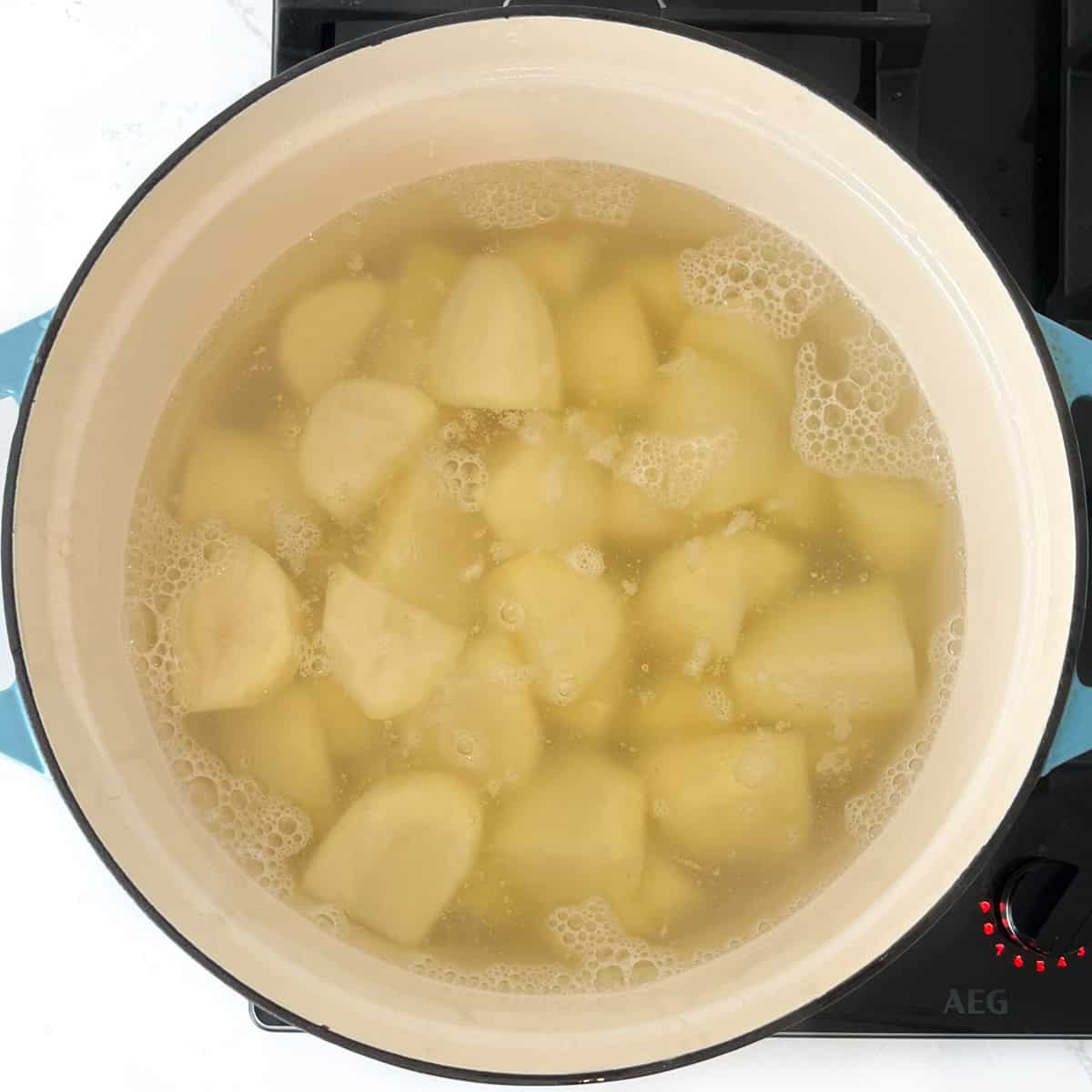
- Preheat the oven to 230C (450F).
- In a large pot, bring approximately two litres of water to a rapid boil.
- Add the salt, bicarbonate of soda and the potatoes. Give it a good stir.

- Bring the water back to a boil and cook the potatoes uncovered for 8-10 minutes (from the boiling point) or until the tip of a knife can be inserted into a potato with little resistance.

- While the potatoes are cooking, mix together the oil, herbs and black pepper in a small bowl.

- After parboiling the potatoes, drain the cooking water and rinse them under cold, running tap water to halt the cooking process. Then, drain them again.
- Allow the potatoes to rest for 5 minutes to let some of the steam evaporate and for them to dry.

- Pour the oil with herbs evenly over the potatoes.

- Place the lid on the pot and vigorously shake to roughen up the potatoes. Instead of just shaking it from side to side, also try shaking it up and over.

- Lift the lid to check the progress. You should aim for each potato to have a rough, fluffy surface. If necessary, shake more, but be cautious not to shake so vigorously that the potatoes break apart.

- Transfer the potatoes to a large, rimmed baking sheet in a single layer and leave enough space between each potato to cook and crisp evenly in the oven.

- Optional step - Return to the pot and gather together any mushy, broken bits of potato left at the bottom.

- Spread the mushy potato on top of each potato chunk to add extra texture.

- Roast the potatoes without moving them in the hot oven for 20 minutes. After this time, gently use a spatula to turn them over. Be cautious to avoid breaking the potatoes or separating them from their crispy skins that face the tray.
- Bake for a further 30-35 minutes or until the potatoes are a deep, golden brown and crispy all over.
- Transfer the potatoes to a serving dish. Sprinkle with some rough sea salt if you wish and serve immediately.
Variations
- Change up the herbs or leave it out if you wish. Good options are thyme, rosemary, parsley or Italian seasoning.
- Add garlic granules, garlic powder or onion powder to the oil mixture.
- Add parmesan cheese to the oil mixture for a cheesy flavour.
- Scatter the roasted potatoes with fresh parsley just before serving.
- These crispy potatoes can also be served as an appetiser with a sauce like sour cream and chives dip.
Steps you can prep in advance
- You can parboil the potatoes, roughen them up in the pot with the oil, and then allow them to cool.
Once they have cooled, you can store them in an airtight container in the fridge. When you're ready to roast, remove them from the fridge and bring them to room temperature.
- You can also prepare the herby oil mix in advance. Combine the oil and dried herbs and store the mixture in an airtight container at room temperature.
When you're ready to roast the potatoes, simply give the mixture a good stir before pouring it over the potatoes.
Storage
Fridge:
Allow the roasted potatoes to cool to room temperature before transferring them to an airtight container. Seal the container to prevent moisture loss and odours from the fridge. Place the container in the fridge. Properly stored, roasted potatoes can last in the fridge for 3-4 days.
When you're ready to enjoy your leftover roasted potatoes from the fridge, you can reheat them in the oven at 200C for around 20 minutes, or until heated through.
Freezer:
To extend their shelf life, you can freeze roasted potatoes. First, let them cool completely. Then, spread them out on a baking sheet, making sure they don't touch each other, and place the sheet in the freezer.
Once they're frozen, transfer them to a freezer-safe container or a resealable freezer bag. This helps prevent them from sticking together. Roasted potatoes can be stored in the freezer for up to 2-3 months.
To reheat, remove them from the freezer and allow them to thaw in the fridge overnight. Reheat them in the oven at 200C for around 20 minutes, or until heated through.
To cook from frozen, cook them for a few minutes longer.
Recipe

The Ultimate, Crispy, Roasted Potatoes - All the Secrets!
Equipment
- 1 large lidded saucepan
- 1 large baking sheet
Ingredients
- 2 kilograms potatoes - starchy potatoes like Maris Piper
- 2 litre water
- 2 tablespoons salt
- ½ teaspoon bicarbonate of soda - aka baking soda
- 5 tablespoons oil - 75ml. Any neutral oil like vegetable oil, sunflower oil or canola oil.
- 1 tablespoon Herbes de provence - or your favourite herbs
- black pepper to taste - we use one teaspoon freshly ground black pepper
Instructions
- Wash and peel the potatoes.2 kilograms potatoes
- Slice them into sizable chunks, with a minimum length of 5cm-7.5 cm (2-3 inches).
- Preheat the oven to 230C (450F).
- In a large pot, bring approximately two litres of water to a rapid boil.2 litre water
- Add the salt, bicarbonate of soda and the potatoes. Give it a good stir.2 tablespoons salt, ½ teaspoon bicarbonate of soda
- Bring the water back to a boil and cook the potatoes uncovered for 8-10 minutes (from the boiling point) or until the tip of a knife can be inserted into a potato with little resistance.
- While the potatoes are cooking, mix together the oil, herbs and black pepper in a small bowl.5 tablespoons oil, 1 tablespoon Herbes de provence, black pepper to taste
- After parboiling the potatoes, drain the cooking water and rinse them under cold, running tap water to halt the cooking process. Then, drain them again.
- Allow the potatoes to rest for 5 minutes to let some of the steam evaporate and for them to dry a little.
- Pour the oil with herbs evenly over the potatoes.
- Place the lid on the pot and vigorously shake to roughen up the potatoes. Instead of just shaking it from side to side, also try shaking it up and over.
- Lift the lid to check the progress. You should aim for each potato to have a rough, fluffy surface. If necessary, shake more, but be cautious not to shake so vigorously that the potatoes break apart.
- Transfer the potatoes to a large baking tray and leave enough space between each potato to cook and crisp evenly in the oven.
- Optional step - Return to the pot and gather together any mushy, broken bits of potato left at the bottom.Spread the mushy potato on top of each potato chunk to add extra texture.
- Roast the potatoes without moving them in the preheated oven for 20 minutes. After this time, gently use a spatula to turn them over. Be cautious to avoid breaking the potatoes or separating them from their crispy skins that face the tray.
- Bake for a further 30-35 minutes or until the potatoes are a deep, golden brown and crispy all over.
- Transfer the potatoes to a serving dish. Sprinkle with some rough sea salt if you wish and serve immediately.
**Nutritional data disclaimer**
Please keep in mind that the nutritional information provided below is calculated by a third party and we cannot guarantee the accuracy. We try our best to give you the most accurate information, but we do not take responsibility for errors that may be present. Also, the nutritional value of the recipe may change depending on the exact brands and products used. We recommend that you consult with a qualified healthcare professional or registered dietitian for personalised advice on your dietary needs.
Nutrition
For food safety advice, including guidance on food allergies


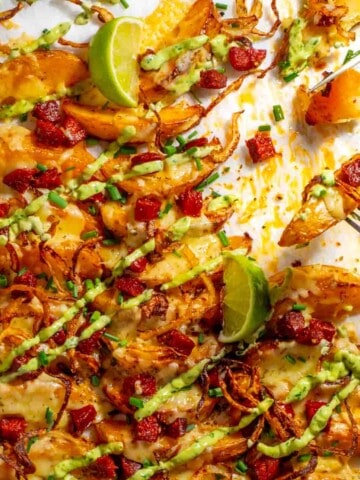
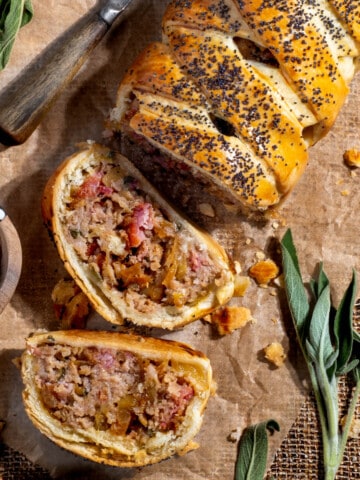
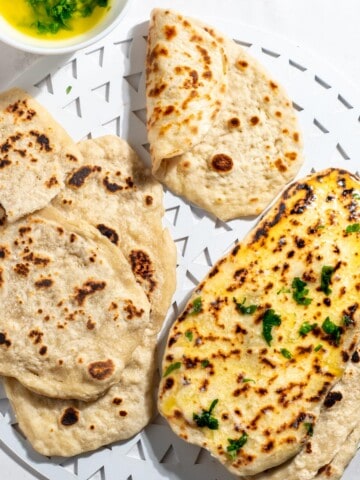
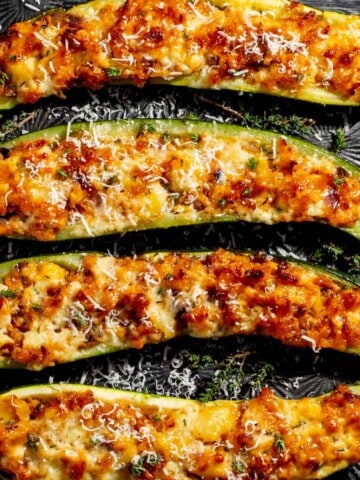
Robert says
Very crispy. Very flavourful. the herbs really add to it. Thanks.
Maretha Corbett says
Hey Robert!
Thanks so much for letting us know you enjoyed the roast potatoes. They are really crispy, aren't they? It's our go-to recipe and so much easier than other methods.
Hope they're on your list for Christmas day!
Happy holidays!
Maretha.